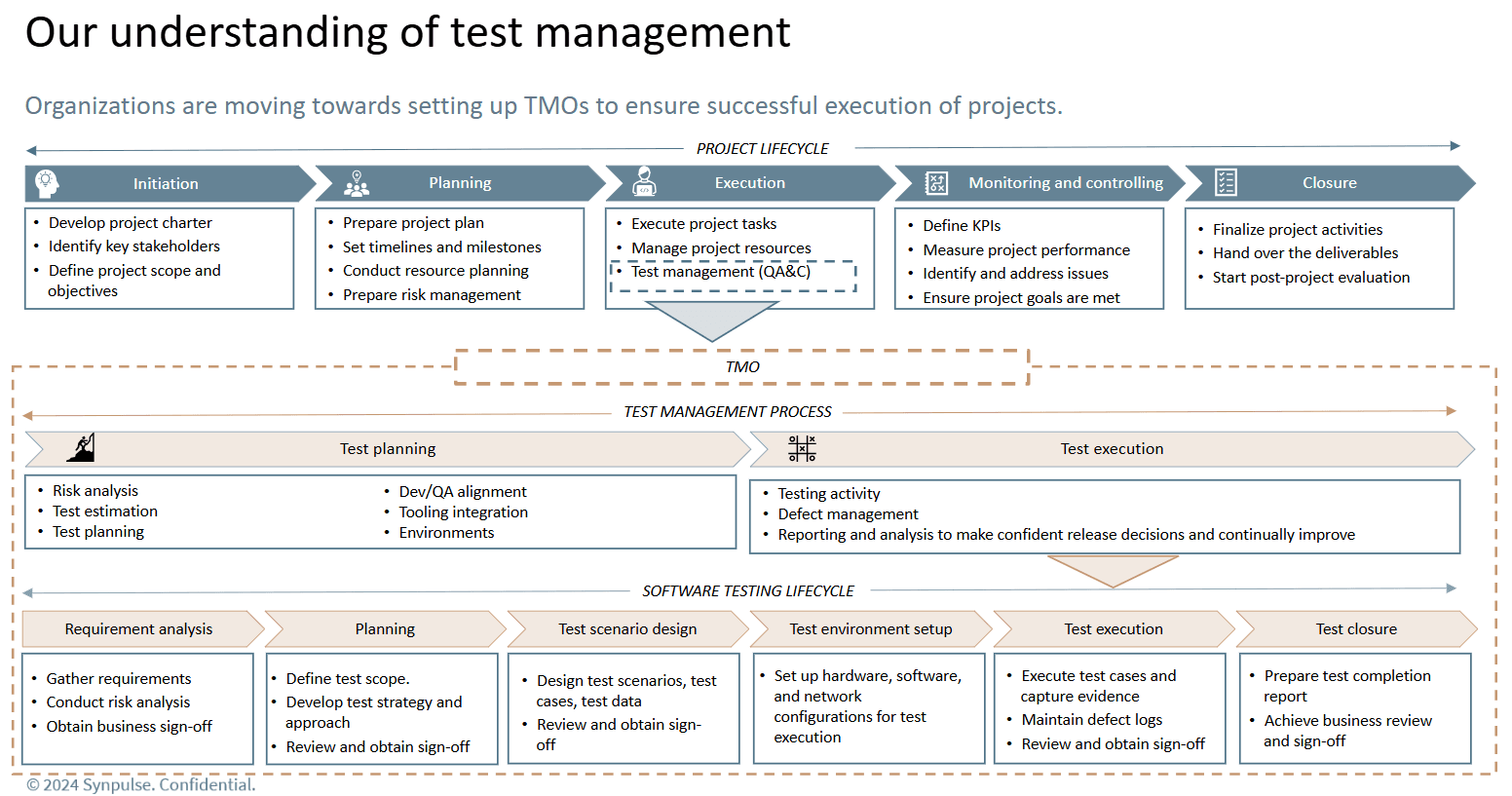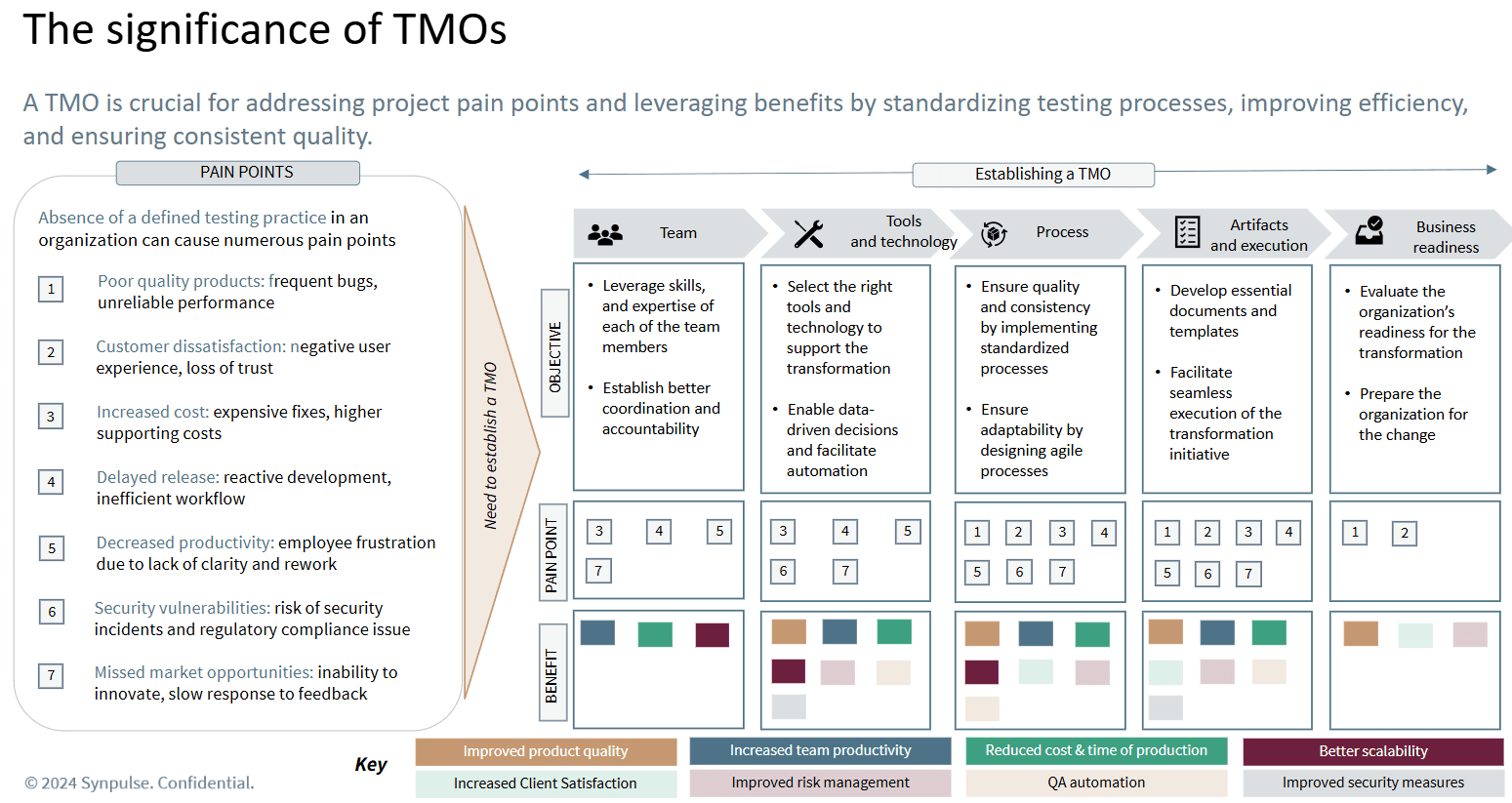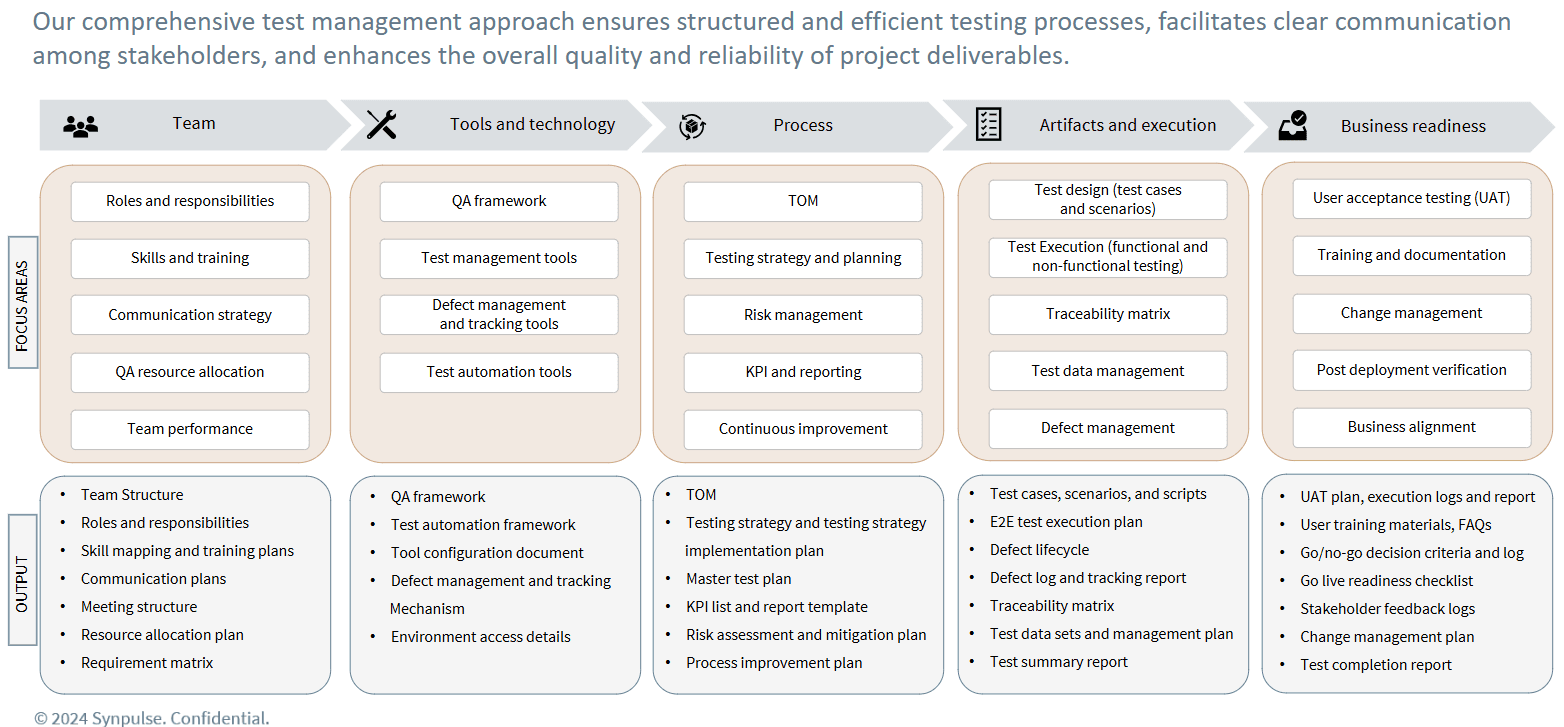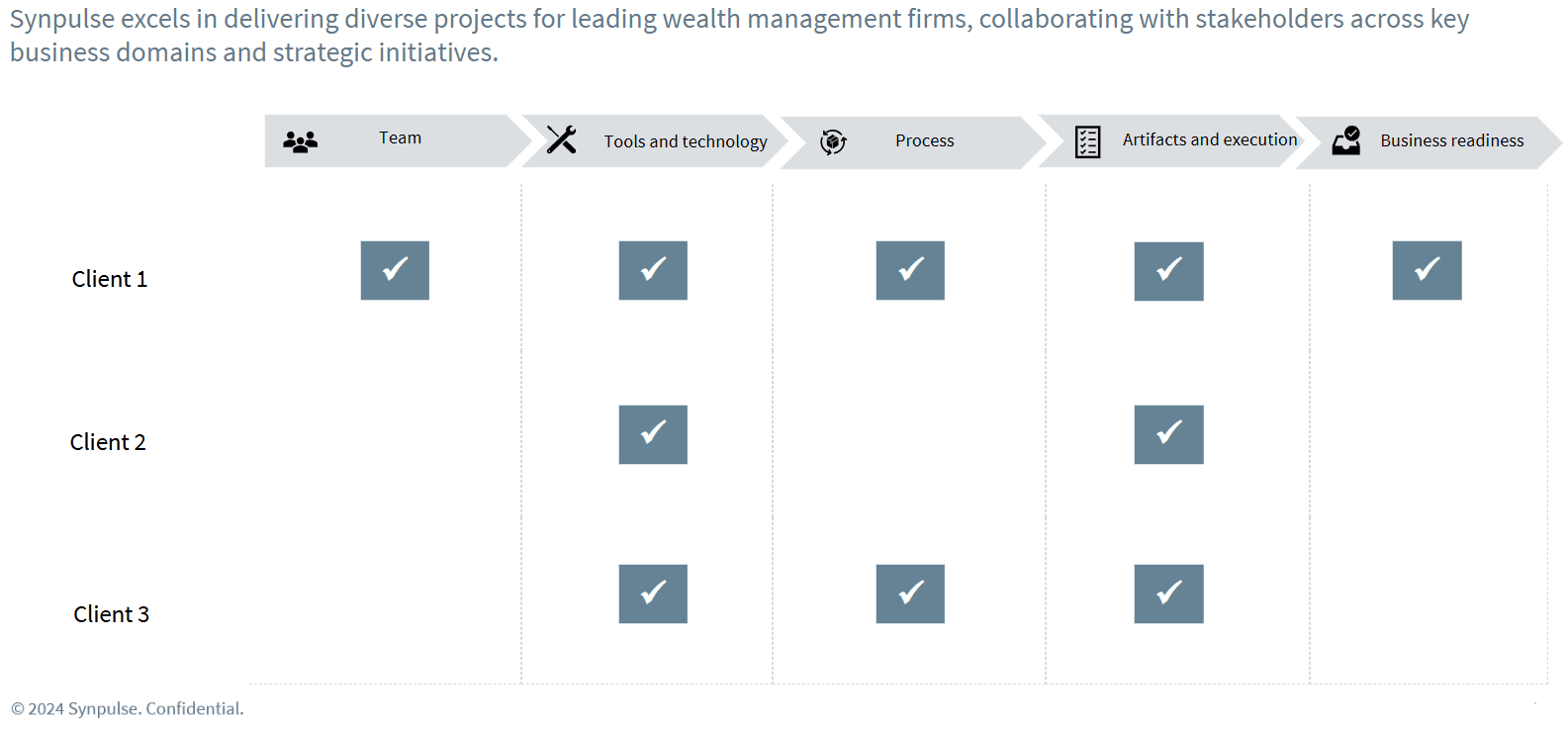Loading Insight...
Insights
Insights

In today’s fast-paced digital landscape, delivering high-quality software products is critical for every organization, regardless of industry. To achieve this, implementing a comprehensive test management framework is no longer optional—it is essential. A well-structured test management framework provides a systematic approach to planning, executing, and monitoring testing processes, ensuring that software meets both functional and non-functional requirements. Beyond just detecting bugs, it enhances collaboration across teams, optimizes resource use, and ensures consistency throughout the development lifecycle.
In this article, we will define the test management process and explore how a robust test management framework can help you deliver high-quality software leading to long terms success in meeting both business and customer demands.
Overview of test management process
The project lifecycle is a meticulously structured journey, typically divided into five essential stages:
- Initiation
- Planning
- Execution
- Monitoring and controlling
- Closure
The test management office (TMO) is introduced at the initiation phase of the project lifecycle. It plays a crucial role in ensuring that testing activities not only align with project goals but are also executed with precision through a well-defined test management process. This process is further broken down into two core pillars:
- Test planning
- Test execution
Notably, test execution adheres to the structured phases of the software testing lifecycle, providing a holistic framework for achieving superior software quality. From methodical test execution to comprehensive defect management and validation, the TMO ensures every aspect of the testing cycle is seamlessly integrated, delivering reliable and high-performing software that meets both business and customer expectations.

Figure 1: The standard TMO setup in an organization
Organizations frequently encounter challenges such as poor product quality, marked by recurring bugs and inconsistent performance, which inevitably lead to customer dissatisfaction, eroding trust and resulting in a negative user experience. These issues not only tarnish a company’s reputation but also drive up operational costs, as expensive fixes and ongoing support strain resources. However, the establishment of a Test Management Office (TMO) can be a game-changer. By implementing a robust testing framework, a TMO helps organizations proactively identify defects, ensure product reliability, and streamline quality control processes. This not only enhances customer satisfaction but also minimizes costly rework, ensuring a smoother, more efficient project lifecycle. In short, a TMO is the cornerstone of delivering reliable, high-quality products while reducing both risks and expense.

Figure 2: The significance of a TMO
How Synpulse can help
Synpulse’s test management approach is a comprehensive framework that spans every stage of establishing a TMO, ensuring a seamless integration of quality assurance practices. Each stage of this process is meticulously crafted and broken down into key focus areas, enabling targeted efforts that drive meaningful outcomes.

Figure 3: Synpulse’s test management approach
Below, we have highlighted some of the client engagements where Synpulse has helped to set up a test management process and resolve certain pain points:

Figure 4: Select Synpulse engagements
Why work with us?
Working with Synpulse means partnering with a trusted global professional services company that combines deep industry expertise with cutting-edge technology to drive transformative outcomes. Our robust test management solutions ensure the delivery of high-quality software by establishing comprehensive frameworks that optimize testing processes, enhance collaboration, and mitigate risks.
Partner with us to streamline your test management journey and ensure your organization stays ahead of the compliance curve.

In today’s fast-paced digital landscape, delivering high-quality software products is critical for every organization, regardless of industry. To achieve this, implementing a comprehensive test management framework is no longer optional—it is essential. A well-structured test management framework provides a systematic approach to planning, executing, and monitoring testing processes, ensuring that software meets both functional and non-functional requirements. Beyond just detecting bugs, it enhances collaboration across teams, optimizes resource use, and ensures consistency throughout the development lifecycle.
In this article, we will define the test management process and explore how a robust test management framework can help you deliver high-quality software leading to long terms success in meeting both business and customer demands.
Overview of test management process
The project lifecycle is a meticulously structured journey, typically divided into five essential stages:
- Initiation
- Planning
- Execution
- Monitoring and controlling
- Closure
The test management office (TMO) is introduced at the initiation phase of the project lifecycle. It plays a crucial role in ensuring that testing activities not only align with project goals but are also executed with precision through a well-defined test management process. This process is further broken down into two core pillars:
- Test planning
- Test execution
Notably, test execution adheres to the structured phases of the software testing lifecycle, providing a holistic framework for achieving superior software quality. From methodical test execution to comprehensive defect management and validation, the TMO ensures every aspect of the testing cycle is seamlessly integrated, delivering reliable and high-performing software that meets both business and customer expectations.

Figure 1: The standard TMO setup in an organization
Organizations frequently encounter challenges such as poor product quality, marked by recurring bugs and inconsistent performance, which inevitably lead to customer dissatisfaction, eroding trust and resulting in a negative user experience. These issues not only tarnish a company’s reputation but also drive up operational costs, as expensive fixes and ongoing support strain resources. However, the establishment of a Test Management Office (TMO) can be a game-changer. By implementing a robust testing framework, a TMO helps organizations proactively identify defects, ensure product reliability, and streamline quality control processes. This not only enhances customer satisfaction but also minimizes costly rework, ensuring a smoother, more efficient project lifecycle. In short, a TMO is the cornerstone of delivering reliable, high-quality products while reducing both risks and expense.

Figure 2: The significance of a TMO
How Synpulse can help
Synpulse’s test management approach is a comprehensive framework that spans every stage of establishing a TMO, ensuring a seamless integration of quality assurance practices. Each stage of this process is meticulously crafted and broken down into key focus areas, enabling targeted efforts that drive meaningful outcomes.

Figure 3: Synpulse’s test management approach
Below, we have highlighted some of the client engagements where Synpulse has helped to set up a test management process and resolve certain pain points:

Figure 4: Select Synpulse engagements
Why work with us?
Working with Synpulse means partnering with a trusted global professional services company that combines deep industry expertise with cutting-edge technology to drive transformative outcomes. Our robust test management solutions ensure the delivery of high-quality software by establishing comprehensive frameworks that optimize testing processes, enhance collaboration, and mitigate risks.
Partner with us to streamline your test management journey and ensure your organization stays ahead of the compliance curve.








